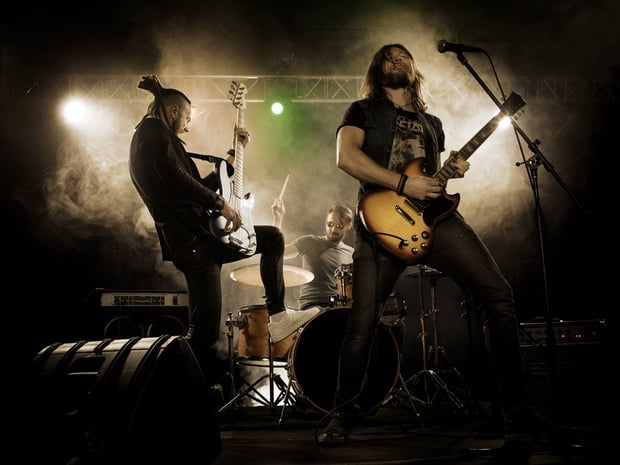 Image via Shutterstock
Image via Shutterstock
Most musicians are focused only on the music – and rightfully so. If you don't play a great show, you're not going to win over fans or be asked back to the venue. But more than being a great band, you want to be taken seriously. Here are seven ways you can step up your game and be a more professional musician.
1. Make a detailed rider agreement
Most serious bands have some form of rider agreement. Now, you may be remembering rumors of bands demanding a bowl of only blue M&Ms, but your rider doesn't need to be that detailed or include such superfluous items. Instead, draft something simple that covers the basics:
- your agreed-upon rate and method of payment (depost up front, door cut, etc.)
- when and where you're playing
- how long your set is
- what the venue will provide (backline, sound engineer, load-in location, etc.)
Fire off those contracts at least two or three weeks before the show so both you and the venue know what's expected. As long as you're not ridiculous about what's in your rider, it can make the venue step up its game and even respect you as a professional.
[How to Advance a Show Like a Pro]
2. Give yourself extra transit time
There's always something that pops up last minute before a gig: a band member is late, there's an accident or construction on the highway, or you get lost on the way. Figure out how long it's going to take you before setting out, and factor in an extra buffer of time. I recommend at least 30 minutes. That way, if something unexpected happens, you're still on time.
There's nothing more irritating to a venue than having an artist who's late for soundcheck, or worse, the show itself. Showing up on time (or even a little early) is an easy way to put yourself in their good graces.
3. Display your merch at every show, no matter how small
Unless you're a brand-new artist playing his or her first gig, you should have some sort of merch available at your shows. I know many artists who simply keep their stuff in their cars and never unload it. This is a big mistake. It shows that you don't expect to sell anything (which isn't a very pro mindset) or that the show isn't important enough for you to bother (also not a very pro mindset and, honestly, a little insulting to the venue). Whether you're playing an arena or a coffeehouse, set up a table for your wares, preferably staffed if you can make it work.
[8 Cheap Merch Items to Bring Fans to Your Table]
4. Hang a clear, eye-catching banner (or two)
It should be a no-brainer, but having a large, full-color sign at your merch table serves a few purposes: it tells people who you are, adds legitimacy to your band, and attracts potential customers.
Your sign or banner should be easily readable and prominently display your band name along with your website. You may even want to make two: one for your merch booth, and one to hang behind you onstage. Some may find this cheesy, but the repetition of your sign is vital to keep your band top of mind for your audience.
5. Figure out a way for people to contact you
Fans not only want to know who you are but also know how to get in touch with you. This is where your email list comes in handy.
It's a good idea to have business cards nearby, too. You never know when someone will approach you about booking a show. Don't have business cards? It's about time to print some up. It's the professional thing to do.
6. Assemble a comprehensive press kit
At the very least, you should have a two- or three-song demo, but to really come off like a pro, you need a full-blown press kit. They're pretty straightforward to make. For the bare basics, you need:
- live footage (ideally with a big crowd)
- press clippings or reviews if you have them
- a short bio
- a band picture
- a few decently recorded songs
A professional-looking press kit can set you apart from other bands and even get you shows you might not be booked for otherwise.
[Want to quickly and easily create your electronic press kit? Get started now with Sonicbids!]
7. Create a master checklist for every gig
A checklist is vital to any gig, especially if you're somewhat disorganized. Did you remember your fog machine? Your T-shirt cannon? Cables? Instruments? Loading up can be chaotic, especially if you're under pressure or running late.Double check everything. Triple check. Then check again. You don't want to show up to the gig minus equipment, signs, or some other important item.
If you make these seven items a priority, you'll be on your way to impressing any venue you play. Don't forget to be courteous and friendly as well. A winning combination of courtesy, professionalism, and talent will go a long way.
Daniel Reifsnyder is a Nashville-based, Grammy-nominated songwriter, having started his musical journey at the age of three. In addition to being an accomplished commercial actor, his voice can be heard on The Magic School Bus theme song and in Home Alone 2. Throughout his career, he has had the honor of working with the likes of Michael Jackson and Little Richard among many others. He is a regular contributor to several music-related blogs, including his own.







